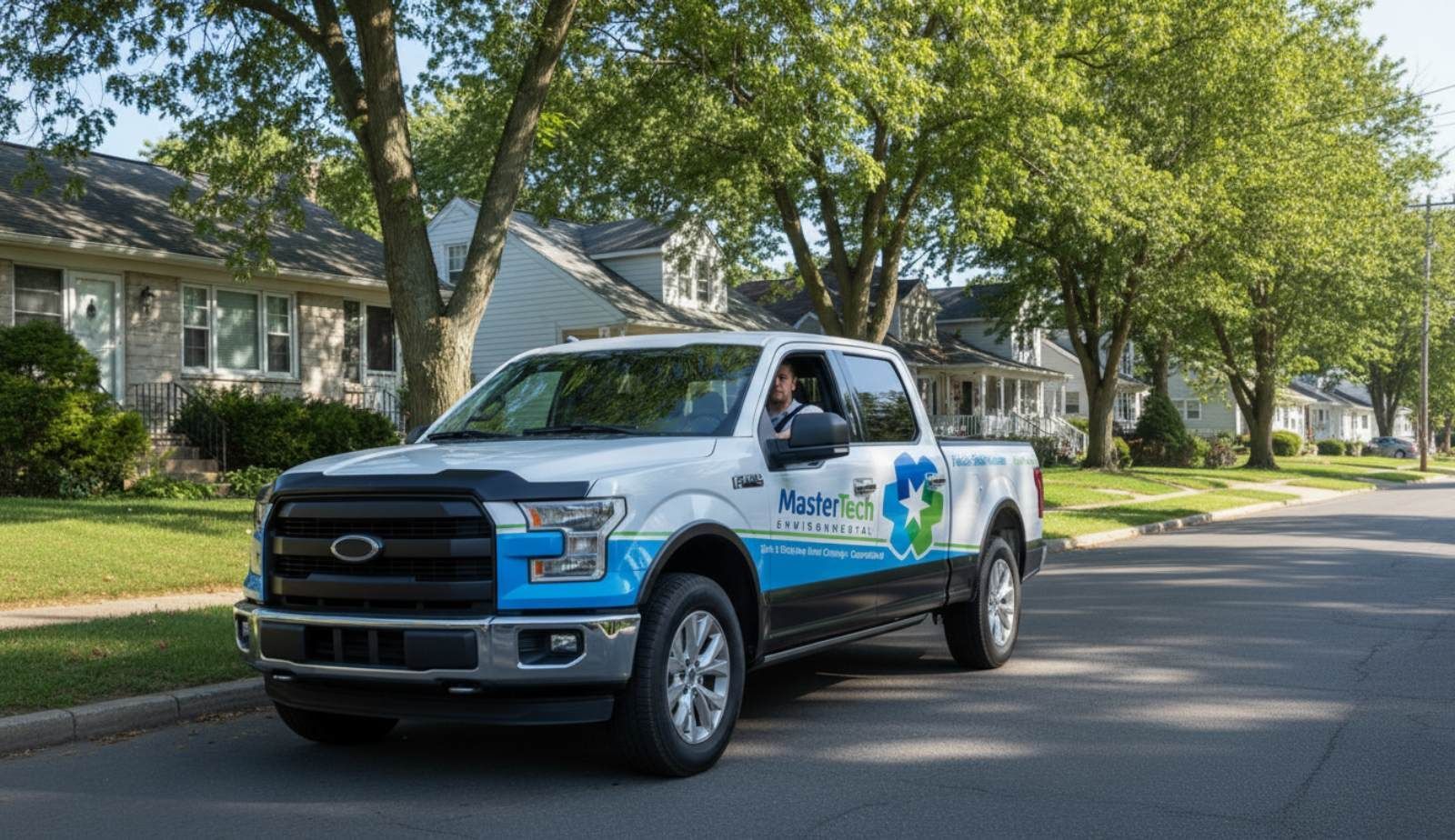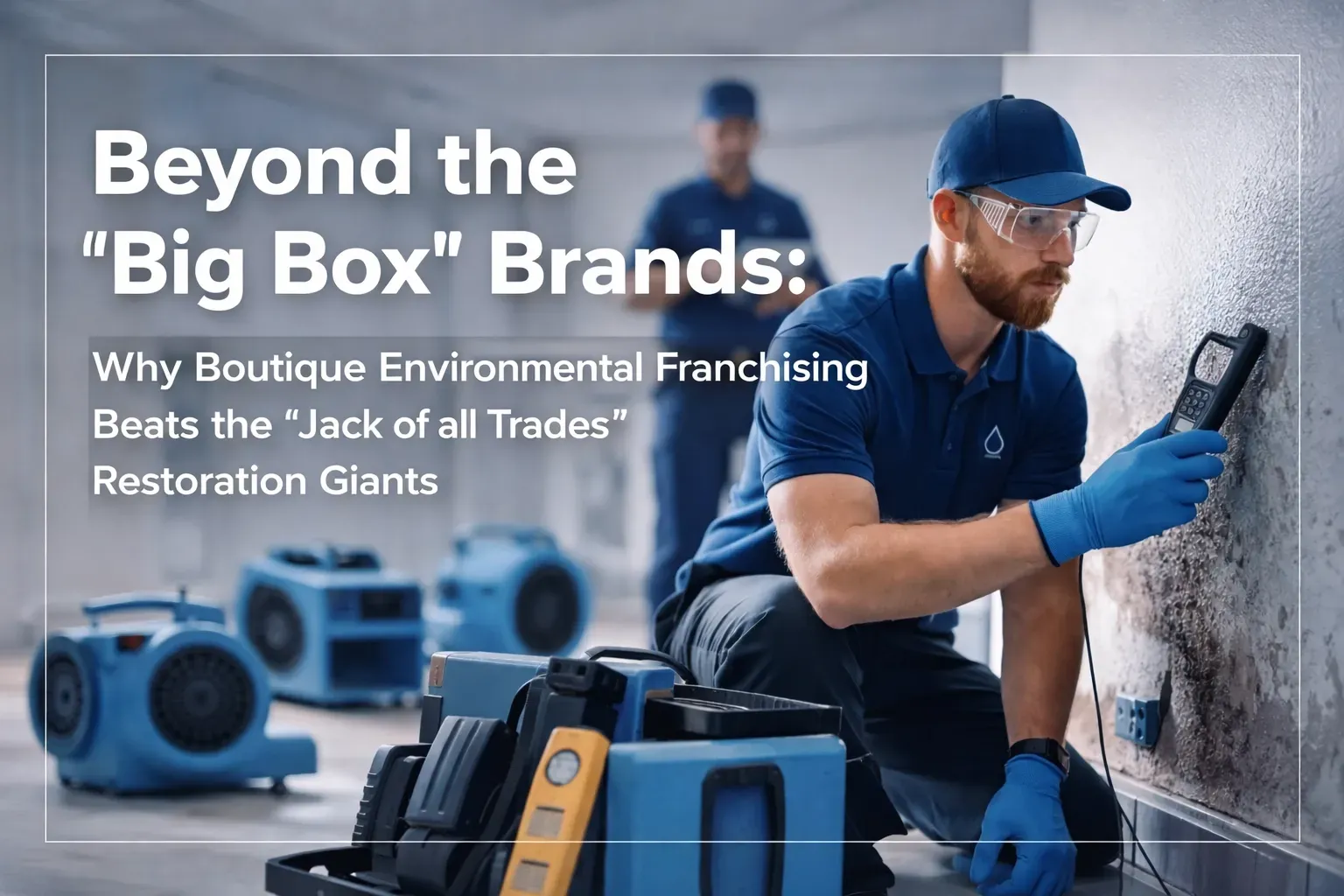
Investing in a mold remediation and water damage restoration franchise presents a lucrative opportunity in San Francisco, California.
The city's damp climate and aging infrastructure create ongoing demand for these essential services. Mastertech Environmental, a respected name in the industry, offers franchises that provide comprehensive solutions including hoarding cleanup and crime scene remediation.
The Mastertech Environmental franchise for sale in San Francisco equips entrepreneurs with proven systems, training, and support to succeed in this specialized field. This turnkey business model allows franchise owners to hit the ground running, serving both residential and commercial clients across the Bay Area. With a growing awareness of indoor environmental health issues, the need for professional remediation services continues to rise.
San Francisco's unique housing market and diverse property types create ample opportunities for a mold and water damage restoration franchise. From historic Victorian homes to modern high-rises, the city's buildings require expert care to address moisture-related problems. A Mastertech Environmental franchise positions owners to meet this demand while building a sustainable business in a thriving metropolitan area.
Benefits of Investing in a Franchise
Investing in a franchise offers several advantages for entrepreneurs looking to start a business. These benefits can significantly impact the success and growth potential of your venture.
Established Brand Recognition
When you invest in a mold remediation franchise, you gain instant access to an established brand. This recognition helps build trust with potential customers. Clients are more likely to choose a known name for sensitive services like mold removal or crime scene cleanup.
Brand familiarity can lead to increased customer satisfaction and loyalty. It also reduces the time and resources needed for marketing and building a reputation from scratch.
Established franchises often have a track record of reliability. This can be crucial in industries where trustworthiness is paramount, such as water damage restoration or hoarding cleanup.
Comprehensive Support and Training
Franchises typically provide extensive training programs for new owners. These programs cover all aspects of running the business, from technical skills to management practices.
Ongoing support is another key benefit. Franchisors often offer assistance with:
- Marketing strategies
- Operational procedures
- Customer service protocols
- Equipment selection and maintenance
This support structure helps franchisees maintain high standards of service quality. It also allows them to stay updated on industry best practices and regulations.
Proven Business Model
A franchise offers a tested business model that has demonstrated success in various markets. This reduces the risk associated with starting a new business from scratch.
The proven model includes:
- Efficient operational systems
- Effective marketing strategies
- Optimized pricing structures
- Established supplier relationships
Franchisees benefit from years of experience and refinement built into these systems. This can lead to faster profitability and growth compared to independent startups.
The model's success is often backed by data on customer satisfaction and financial performance. This information can be valuable for securing financing and planning for future expansion.
Understanding Mold and Water Damage Restoration
Mold and water damage pose significant risks to both property and health. Proper restoration requires specialized knowledge and techniques to effectively address these issues and prevent future occurrences.
Key Causes of Mold and Water Damage
Mold thrives in damp environments, often resulting from water damage. Common sources include:
- Plumbing leaks
- Roof leaks
- Poor ventilation
- High humidity levels
- Flooding
Water damage can occur suddenly or develop over time. Leaky pipes, faulty appliances, and natural disasters are frequent culprits. Excess moisture creates an ideal environment for mold growth, leading to structural issues and health concerns.
Identifying and addressing the root cause is crucial for effective remediation. Regular inspections and prompt repairs can prevent extensive damage and costly restorations.
Health Implications of Mold Exposure
Mold exposure can lead to various health issues, particularly affecting respiratory health. Common symptoms include:
- Allergic reactions (sneezing, runny nose, skin rashes)
- Asthma attacks or worsening of existing asthma
- Eye irritation
- Headaches
- Fatigue
Prolonged exposure may result in more severe health problems. Individuals with compromised immune systems, allergies, or respiratory conditions are at higher risk.
Indoor air quality is significantly impacted by mold growth. Spores can circulate through HVAC systems, affecting multiple areas of a property.
Professional assessment and remediation are essential to minimize health risks associated with mold exposure.
Basic Principles of Mold Remediation
Effective mold remediation involves several key steps:
- Identify and fix the moisture source
- Isolate contaminated areas
- Remove affected materials
- Clean and disinfect surfaces
- Dry the area thoroughly
- Implement preventive measures
Professional mold remediation services use specialized equipment and techniques to ensure thorough removal. This may include HEPA air filtration, negative air pressure containment, and antimicrobial treatments.
Proper disposal of contaminated materials is crucial to prevent further spread. Restoration efforts focus on repairing damaged areas and implementing strategies to prevent future mold growth.
Regular monitoring and maintenance are essential for long-term mold prevention.
Analyzing the Market in San Francisco
San Francisco's restoration services market shows strong potential for new entrants. The city's unique climate and aging infrastructure create ongoing demand, while the competitive landscape remains relatively open for innovative companies.
Demand for Restoration Services
San Francisco's foggy, damp climate contributes to persistent moisture issues in buildings. This environmental factor, combined with the city's aging housing stock, creates a steady need for water damage restoration and mold remediation services.
The city's high property values incentivize quick action when water damage occurs. Homeowners and businesses are willing to invest in professional restoration to protect their valuable assets.
Natural disasters like earthquakes and seasonal flooding further boost demand for restoration services. These events can cause widespread damage, requiring specialized cleanup and restoration expertise.
Competitive Landscape
San Francisco's restoration market features a mix of established companies and newer entrants. Swift Restoration and Water's Fault are among the prominent local providers, offering services ranging from water damage cleanup to mold removal.
Customer reviews indicate varying levels of satisfaction with existing providers. This suggests opportunities for new companies to differentiate themselves through superior service quality and reliability.
The market is not saturated, leaving room for well-executed franchises to gain market share. Established brands like Mastertech Environmental can leverage their proven systems and reputation to compete effectively.
Successful companies in this space often emphasize rapid response times, comprehensive services, and strong relationships with insurance providers. These factors are crucial for success in San Francisco's competitive market.
Franchise Operations and Management
Operating a mold remediation and restoration franchise requires careful management and adherence to industry standards. Successful franchisees focus on efficient daily operations, excellent customer service, and consistent quality control.
Daily Operations of a Restoration Business
Mold remediation franchises handle a variety of tasks each day. Teams respond to emergency calls, conduct inspections, and perform cleanup and removal services. Scheduling is crucial, as jobs can vary in scope and urgency.
Equipment maintenance is essential. Franchisees must ensure all tools and protective gear are in top condition. This includes regular cleaning and calibration of moisture meters, air scrubbers, and dehumidifiers.
Administrative tasks are also a key part of daily operations. This involves managing work orders, updating client records, and processing insurance claims. Efficient office procedures help maintain a smooth workflow.
Staffing and Customer Service Excellence
Hiring and training qualified staff is critical for franchise success. Technicians need proper certifications in mold remediation and water damage restoration. Ongoing training keeps teams up-to-date with industry standards and new techniques.
Customer service is paramount. Staff should be trained to handle client concerns with empathy and professionalism. Clear communication about the remediation process helps build trust and ensures customer satisfaction.
On-call rotations are often necessary to provide 24/7 emergency services. Franchisees must manage staff schedules to balance workload and prevent burnout.
Quality Control and Service Delivery
Maintaining high standards is essential in the restoration industry. Franchisees must implement strict quality control measures to ensure consistent service delivery. This includes regular inspections of completed jobs and adherence to industry-specific protocols.
Documentation is crucial for quality assurance. Detailed reports, including before and after photos, provide evidence of work performed and help with insurance claims. Franchisees should establish clear procedures for thorough documentation.
Customer feedback is valuable for improving service quality. Implementing a system to collect and analyze client reviews can help identify areas for improvement and maintain high standards of service delivery.
Industry Techniques and Technologies
The mold remediation and water damage restoration industry employs cutting-edge techniques and advanced technologies. These innovations improve efficiency, effectiveness, and safety in addressing environmental hazards.
Innovative Mold Remediation Techniques
Mold remediation processes have evolved significantly. Modern techniques focus on thorough containment and removal of mold-infested materials. HEPA filtration systems are now standard, capturing microscopic spores to prevent spread.
Antimicrobial treatments have become more sophisticated. These products target mold at the cellular level, inhibiting future growth. Some companies use eco-friendly alternatives that are effective yet safe for occupants and pets.
Thermal imaging cameras detect hidden moisture, allowing technicians to identify potential mold growth areas before they become visible. This proactive approach saves time and reduces property damage.
Advanced Water Damage Restoration Methods
Water mitigation techniques have improved dramatically. Rapid response teams use powerful extraction equipment to remove standing water quickly. This swift action minimizes secondary damage and mold growth.
Infrared technology plays a crucial role in detecting moisture in walls and flooring. Technicians can pinpoint affected areas without invasive measures, leading to more targeted and efficient drying processes.
Advanced drying systems, including desiccant dehumidifiers and low-grain refrigerant dehumidifiers, control humidity levels precisely. These tools accelerate the drying process while maintaining optimal conditions for structural materials.
Equipment and Tools for Best Results
Air scrubbers with HEPA filters are essential for improving indoor air quality during remediation. These devices remove airborne contaminants, including mold spores, dust, and other particulates.
High-capacity dehumidifiers are crucial for moisture control. Industrial-grade units can extract hundreds of liters of water daily, significantly speeding up the drying process.
Moisture meters and hygrometers allow technicians to monitor humidity levels and material moisture content accurately. This data ensures thorough drying and helps prevent future mold growth.
Specialized cleaning tools, such as HEPA vacuums and antimicrobial foggers, ensure thorough decontamination of affected areas. These tools help restore properties to a safe and habitable condition.
Navigating Legal and Safety Regulations
Operating a mold remediation and water damage restoration franchise involves adhering to strict legal and safety regulations. Compliance ensures the protection of workers, clients, and the environment while mitigating potential liabilities.
Compliance with Health and Safety Standards
Mold remediation franchises must follow guidelines set by organizations like OSHA and the EPA. These standards cover proper containment procedures, use of personal protective equipment (PPE), and safe disposal of contaminated materials.
Franchisees should implement regular training programs to keep staff updated on the latest safety protocols. This includes proper handling of chemicals, operation of specialized equipment, and emergency response procedures.
Quality control measures are essential to maintain consistent service standards. Regular inspections and documentation of remediation processes help ensure compliance and can serve as protection in case of disputes.
Understanding Liability and Insurance
Mold remediation businesses face unique liability risks. Comprehensive insurance coverage is crucial to protect against potential claims related to property damage, health issues, or improper remediation.
Key insurance types include:
- General Liability
- Professional Liability (Errors and Omissions)
- Workers' Compensation
- Pollution Liability
Franchisees should work with insurance providers specializing in environmental services to ensure adequate coverage. Regular policy reviews help address changing risks and regulations.
Proper documentation and record-keeping are vital for protecting against liability claims. This includes detailed job reports, before-and-after photos, and client communication records.
Marketing Strategies for Your Franchise
Effective marketing is crucial for the success of your mold remediation and restoration franchise in San Francisco. A well-planned strategy can help you reach potential customers and build a strong brand presence.
Building a Strong Online Presence
Creating a robust online presence is essential for attracting customers in the digital age. Develop a user-friendly website that showcases your mold remediation and restoration services. Optimize it for local search terms to improve visibility in San Francisco.
Utilize social media platforms to engage with potential clients and share valuable content about mold prevention and remediation. Regular posts can establish your franchise as an authority in the field.
Invest in targeted online advertising campaigns to reach homeowners and businesses in need of mold removal services. Use location-based targeting to focus on the San Francisco area.
Leveraging Customer Testimonials and Reviews
Customer reviews and testimonials are powerful tools for building trust and credibility. Encourage satisfied clients to leave reviews on popular platforms like Google My Business and Yelp.
Feature positive testimonials prominently on your website and marketing materials. These real-life experiences can showcase the quality of your restoration work and customer service.
Respond promptly and professionally to all reviews, both positive and negative. This demonstrates your commitment to customer satisfaction and can help mitigate any potential negative impact.
Networking and Community Engagement
Active participation in local business networks and community events can significantly boost your franchise's visibility. Join the San Francisco Chamber of Commerce and attend industry-specific conferences to connect with potential partners and clients.
Sponsor local events or participate in community service projects related to home maintenance or disaster preparedness. This can enhance your brand's reputation and create positive associations with your franchise.
Collaborate with other home service providers, such as real estate agents or general contractors, to create referral partnerships. These relationships can be valuable sources of new business opportunities in the San Francisco area.
Frequently Asked Questions
Starting a mold remediation and restoration franchise involves several key considerations. Potential franchisees often have questions about costs, market demand, training requirements, and regulatory factors.
What are the startup costs associated with a mold remediation and restoration franchise?
Initial investments for a mold remediation franchise typically range from $100,000 to $500,000. This includes franchise fees, equipment purchases, and working capital.
Costs vary depending on location, franchise brand, and scope of services offered. Mold remediation equipment can be a significant expense.
How do I determine the demand for mold remediation & water damage restoration services in San Francisco?
Research local climate conditions, housing stock age, and recent weather events. San Francisco's foggy climate and older buildings can contribute to mold issues.
Analyze competitor presence and market saturation. Contact local property managers and real estate agents to gauge demand for restoration services.
What are the key factors in running a successful hoarding and crime scene cleanup business?
Discretion and professionalism are crucial when dealing with sensitive situations. Develop strong relationships with law enforcement and social services agencies.
Invest in specialized equipment and proper training for biohazard cleanup. Ensure compliance with OSHA regulations for handling hazardous materials.
What training and certifications are necessary for operating a restoration franchise?
IICRC certifications are industry standard for water damage restoration and mold remediation. OSHA safety training is essential for all employees.
Franchise-specific training programs often cover business operations, marketing, and customer service. Ongoing education is important to stay current with industry best practices.
What strategies ensure long-term profitability in the environmental services industry?
Diversify service offerings to include water damage restoration, fire cleanup, and biohazard remediation. Build relationships with insurance adjusters and property managers.
Invest in marketing and customer education about the importance of prompt mold remediation. Provide excellent customer service to generate referrals and repeat business.
How do government regulations impact the mold remediation and restoration industry?
EPA guidelines influence industry standards for mold assessment and remediation. State and local regulations may require specific licensing or certifications.
Compliance with OSHA safety standards is mandatory. Stay informed about changes in environmental regulations that could affect remediation practices or disposal procedures.
Get in Touch
Contact Us
Don't be a stranger!
30 Broad St, Unit 7
Denville, New Jersey 07834



